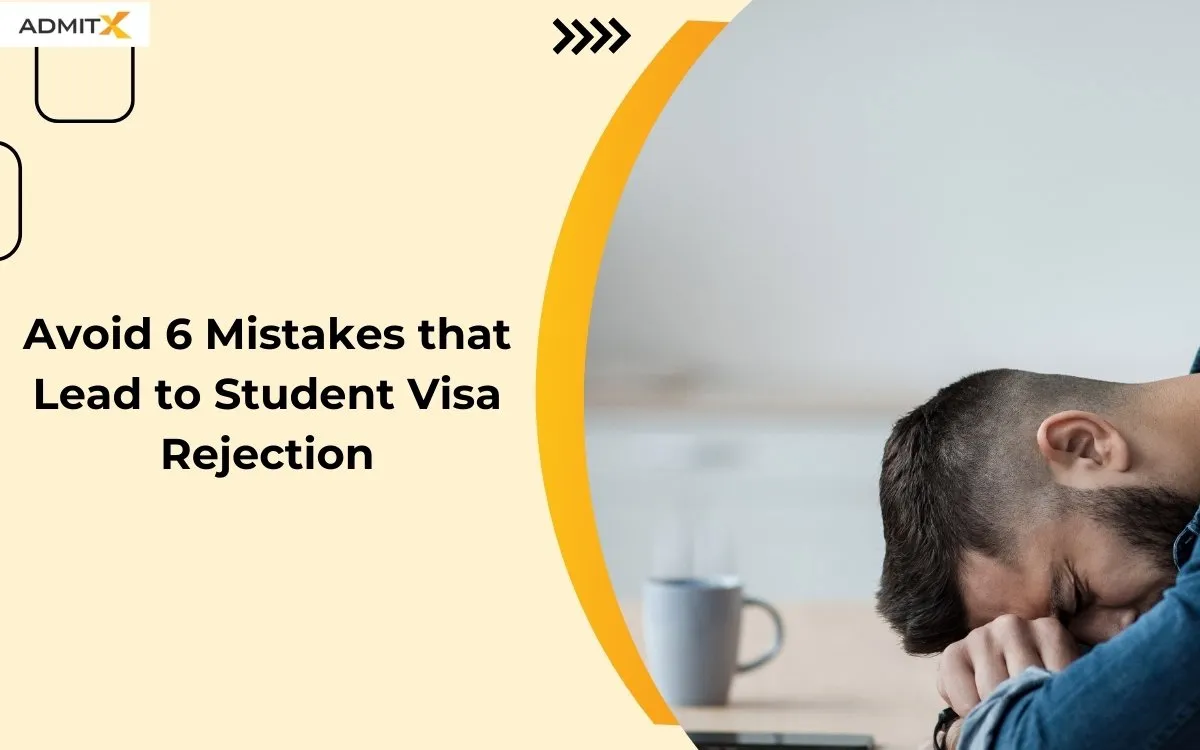
Avoid 6 Mistakes that Lead to Student Visa Rejection
A student visa or study permit allows you to enter your dream country to pursue higher studies for which you have hustled so far. However, most students commit common mistakes that might lead to visa rejection.
These mistakes include lack of documents or improper documentation, insufficient proof of funds, inability to answer interview questions properly, and many more, which we have discussed in this blog. We have also provided important tips that will help you overcome such situations.
Top Student Visa Rejection Reasons
While making a student visa application, you should be aware of the whole process so that you will not face any difficulty in getting the visa. Let us discuss some of the common student visa rejection reasons.
Late Visa Application Filing
- This is one of the most common reasons for visa rejection that applicants should be aware of.
- Taking care of timelines to file a study visa application demonstrates a genuine interest and commitment to pursue higher studies in a foreign country.
- Countries like the USA, Canada, the UK, Australia, France, and other European countries require students to be well-prepared before applying for a student visa.
- Applying late for the student visa often leads to automatic rejection without even considering the application.
- Preparing in advance takes a significant amount of time because it involves the following process:
- Arranging and gathering the documents
- Applying online or in person (at embassy/consulate or agency)
- Submitting the documents with an application fee.
- Scheduling a visa appointment or interview.
- Appearing for interview
- Decision and visa issuance
How to Avoid it?
Start applying for a student visa when you get a university offer letter by arranging and gathering all the required documents.
You should aim to complete the visa application process at least 3-4 months before the intended course start date because the visa processing might take a significant amount of time, which you need to cover.
Improper Documentation
- To issue a non-immigrant visa, countries ask applicants to submit the original documents that showcase the person’s valid proof of identification and candidature.
- These documents might differ according to country.
- Failing to provide documents or submitting incomplete sets of documents can also lead to visa application rejection.
- In some cases, consulates or embassies may allow you to correct the mistake or submit additional documents after initial submission.
- However, this is applicable in those cases where the rest of the application part is strong and missing documents are a minor issue.
- Consistent rejection due to improper documentation may allow countries to blacklist the candidates to prevent them from applying next time.
How to Avoid it?
- Before applying for a study visa, read the country’s specific instructions carefully, such as the documents required, application fee, additional requirements, etc.
- Review the visa checklist thoroughly on the official website of the embassy or consulate of the country you are applying to.
- Follow the formatting of the documents, such as passport photo size, document translation, and certified copies.
- Before submitting the documents, proofread them because typos, grammatical errors, and incorrect document format may lead to cancellation of the application.
Insufficient Proof of Funds
- It is an important part of the student visa application process because it demonstrates the ability of the students to afford their annual expenses in the country for which they are applying.
- These expenses include tuition fees, living expenses, and other funds.
- It also showcases that students have sufficient financial resources to manage their stay without relying on public funds.
- Applicants are also required to show the source of their funding, which can be personal savings, loans, scholarships, study grants, etc.
- For this, you are required to submit the following documents:
- Last 6 months’ bank statements (applicant or applicant’s parents/sponsor in case the applicant is minor or doesn’t have a bank account)
- Last 6 months income tax returns (applicant or applicant’s parents/sponsor if applicant is not working)
- Scholarship Letter provided by the university or any study granting institution
- Loan Sanction Documents
- Fixed Deposit Documents
- Provident Funds Documents
- Credit/Debit Card Statements
- Last 3 months’ Pay Slips (applicant or applicant’s parents/sponsor)
| Country | Required Fund (Per Year) | Additional Document to Showcase Proof of Fund |
|---|---|---|
| USA | USD 18,000 or INR 15.67 Lakhs (consider 1.5 times the fund mentioned in the I-20 form) | I-20 Form |
| UK | GBP 17,796 or INR 19.23 Lakhs (for London) GBP 13,632 or INR 14.73 Lakhs (outside London) | CAS Letter |
| Ireland | EUR 10,000 or INR 9 Lakhs | Not Applicable |
| Canada | CAD 20,635 or INR 12.46 Lakhs | GIC Certificate |
| France | EUR 7,380 or INR 6.63 Lakhs | Not Applicable |
| Germany | EUR 11,904 or INR 10.70 Lakhs | German Blocked Account |
| Australia | AUD 29,710 or INR 16.07 Lakhs | Genuine Student (GS requirement) |
How to Avoid it?
- Understand the funds requirements of the country you are applying to by the above table.
- Prepare for the required funds at least 3-6 months before applying for the student visa. Authorities may not accept last-minute financial transfers as legitimate proof.
- Try to diversify your fund resources (savings, scholarships, loans, or family funding) that will demonstrate your strong financial status.
- Open a dedicated bank account to save and accumulate the required amount of money, and do not use it for any other purpose.
Inability to Convince Visa Interviewer
The inability to convince visa interviewers can also lead to student visa rejection as they are looking for certain qualities and assurance from the candidates. A visa interview evaluates the following key factors.
- Genuineness of a candidate
- Eligibility of the candidate for the student visa,
- Study visa documentary proof such as academic qualifications, language proficiency, and acceptance of the candidature by the institutes.
Not Intent to Return
- A student visa is a nonimmigrant or temporary visa that requires students to return to their home country once their studies are completed.
- Visa authorities aim to ensure applicants comply with immigration policies and genuinely intend to pursue education in their chosen country.
- Refusals on this ground often occur due to a lack of clarity in demonstrating genuine academic intent.
- In some cases, visa officers may suspect that the primary motive is illegal immigration rather than education.
How to Avoid it?
- Submit a strong statement of purpose (SOP) describing your aim of pursuing the particular country, course, and university.
- Don’t forget to include a university offer letter along with your visa application.
- Highlight ties with your home country by providing sufficient evidence of your local connections (family and relatives) and future employment prospects.
Poor English Language Proficiency
- Not meeting the English language proficiency requirements can become a strong ground on which student visa applications can be denied.
- Visa authorities may question your ability to succeed academically and adapt culturally.
How to Avoid it?
- Enroll in the English language course to strengthen your speaking, writing, listening, and reading skills.
- Take English language proficiency skill tests such as IELTS, TOEFL, PTE, etc., depending on the desired country and university.
- Aim to score above the minimum requirements set by authorities.
- You can also consider submitting the medium of instruction (MOI) if you have completed your previous education in the English language.
Common Reasons for Rejection and How to Address Them
| Reasons for Rejection | How to Tackle? |
|---|---|
| Inconsistent or misleading response | Be honest and straightforward while replying without any hesitation. Prepare well for the interview by going through common interview questions that might be asked. |
| Overemphasis on employment rather than education | Even if you go to any specific country for academic-cum employment purposes, keep your academic intention as your primary motive. |
| Errors in submitted documents, such as missing documents or grammatical errors | Review the document checklist carefully twice before submitting it. Keep the additional copies of all documents. |
| Low academic performance | Provide a strong statement of purpose (SOP) explaining your passion and efforts to overcome academic challenges |
| Insufficient financial proof | Include proof of funds and an application that reflects your claim of a sufficient bank balance. |
Key Takeaways by AdmitX
Student visa rejections can overwhelm applicants when they have invested considerable time, energy, and finances. Visa rejections might feel like setbacks, but understanding their reasons and rectifying them can improve the chances of getting a study permit of your choice.
At AdmitX, we have a clear objective to assist Indian students in facilitating their visa application so that they can fulfill their dream of studying abroad.
FAQs
My student visa application was rejected; how can I reapply?
You can reapply for the student visa after 6 months of rejection on the official website of the immigration portal of the desired country.
What documents are required to apply for a student visa?
The documents that are required to apply for a study visa include a university offer letter, bank statements, income tax returns, proof of financial resources, a cover letter, and a statement of purpose. Depending on the country, these requirements can vary.
Why do students' visas get rejected?
Some of the common study visa rejection reasons include improper documentation, failure to apply within a specified time frame, lack of financial resources to show proof of funds, and inability to convince the visa officer about the intent of visiting the country.
How can I avoid visa rejection?
Depending on some common challenges faced by students, you should ensure that your visa application is submitted on time with proper documentation and highlight the financial stability enough to support yourself while studying in the particular country of your choice.
What is a study visa rejection letter?
A letter of explanation (LOE) or visa rejection letter is a formal document that informs the applicant of the inability to move forward with the visa application by that particular country. It includes the specific reasons why a study visa is rejected.







